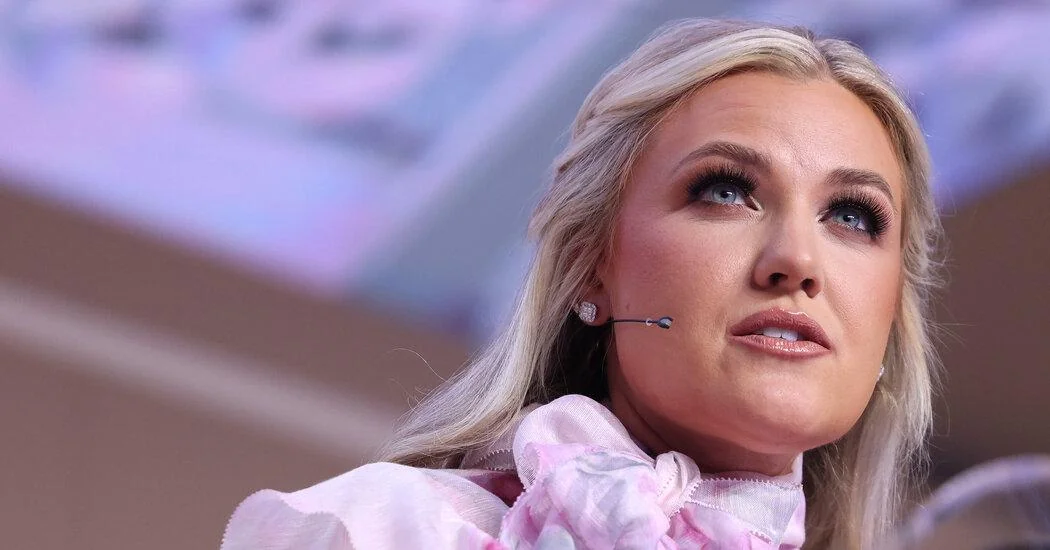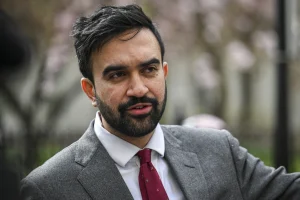Erika Kirk has broken her silence for the first time since the death of her husband, Charlie Kirk, addressing the scrutiny she has faced over her public appearances and interactions with prominent political figures, including Vice President JD Vance. The widow of the controversial right-wing commentator has found herself in the national spotlight, navigating grief while stepping into leadership roles and confronting public criticism.
Charlie Kirk, the founder of Turning Point USA and a well-known conservative commentator, was tragically shot and killed in September while speaking at a debate at Utah Valley University. His sudden death shocked both the nation and the conservative political community, leaving Erika Kirk and their two children to cope with an unimaginable loss.
Since Charlie’s passing, Erika has become the focal point of media attention. She played a prominent role in the large memorial service held at the State Farm Stadium in Glendale, Arizona, which drew high-profile figures including former President Donald Trump and Vice President JD Vance. Her position in the public eye has placed her under intense scrutiny, with many analyzing her every move and public appearance.
Taking the Helm at Turning Point USA
In the wake of her husband’s death, Erika has pledged to continue his work by taking on the role of CEO at Turning Point USA, the non-profit organization he co-founded. The organization, which focuses on promoting conservative values on college campuses and beyond, has grown substantially under Charlie Kirk’s leadership, and Erika now faces the challenge of guiding it forward amid both grief and heightened public attention.
Erika’s new responsibilities have placed her in close proximity to influential political figures, including Trump and Vance. While many have praised her dedication and resilience, some of her interactions have drawn criticism on social media. One particular moment—her hug with Vice President JD Vance during a Turning Point USA event at the University of Mississippi on October 29—sparked controversy.
During the event, Erika introduced Vance to the stage and shared a hug with him, placing her hand on the back of the vice president’s head in a gesture that some observers described as unusually intimate. Erika also referred to Vance as a “very, very dear friend” in her speech, noting that while no one could ever replace her late husband, she recognized some similarities between Vance and Charlie.
This moment quickly went viral online, with critics labeling it “inappropriate” and dissecting the nature of her public display of affection. Supporters, however, argued that her gestures were natural expressions of grief, respect, and camaraderie in the context of her new role at the organization her husband founded.
Erika’s First Interview Since the Controversy
Now, Erika has spoken out in her first sit-down interview since her husband’s passing, providing a rare glimpse into her perspective amid the public attention. In a preview snippet from an upcoming Fox News interview with Jesse Watters, Erika addressed the intense scrutiny she has faced, emphasizing the challenges of navigating grief under the constant gaze of cameras and commentators.
Watters asked Erika about her feelings regarding the defense’s request to bar cameras from the courtroom for the trial of Tyler Robinson, Charlie’s suspected killer. Erika responded with a passionate defense of transparency, drawing attention to the media attention surrounding her husband’s death and her family’s mourning.
“There were cameras all over my husband when he was murdered. There have been cameras all over my friends and family mourning. There have been cameras all over me, analyzing my every move, analyzing every smile, my every tear,” she said. “We deserve to have cameras in there. Why not be transparent? There is nothing to hide, I know there is not because I have seen what the case is built on.”
Her remarks reflect both a desire for accountability and an awareness of how public narratives are shaped in high-profile cases. Erika’s insistence on transparency signals her commitment to ensuring that the trial of Robinson is conducted openly and fairly, while also acknowledging the toll that public scrutiny has taken on her personal life.
Coping with Grief in the Public Eye
Erika’s experiences highlight the unique challenges faced by individuals who must navigate personal tragedy while simultaneously occupying a highly public role. The loss of a spouse is devastating under any circumstances, but doing so in the glare of media attention compounds the emotional and logistical pressures.
Since Charlie’s death, Erika has been forced to manage not only her own grief but also the expectations of the public and the conservative political community. As CEO of Turning Point USA, she must continue the work her husband championed, maintaining organizational stability while also addressing the concerns of members, donors, and supporters who are watching closely.
Her interactions with political figures such as Trump and Vance are part of this larger responsibility, yet they have also made her vulnerable to criticism. Social media users, journalists, and political commentators have dissected her gestures and public appearances, sometimes unfairly conflating expressions of grief with inappropriate behavior. Erika’s decision to speak out in her interview represents an effort to reclaim her narrative and assert her agency during a period of intense scrutiny.
The Controversy Over the Vance Hug
The hug between Erika Kirk and JD Vance became a lightning rod for commentary. In public settings, gestures of comfort or solidarity are often interpreted through the lens of social norms and political bias. Critics focused on the perceived intimacy of the moment, questioning whether it was appropriate given the public nature of the event and the media attention surrounding it.
Supporters argue that the hug was a natural expression of grief and camaraderie. Erika’s own words during the event—that Vance was a “very, very dear friend” and shared qualities she admired in her late husband—suggest that the gesture was intended as a personal and emotional connection rather than a political statement.
This incident underscores the heightened scrutiny placed on public figures, particularly women, who must navigate the intersection of grief, leadership, and public perception. Erika’s acknowledgment of the criticism in her interview demonstrates her awareness of these pressures and her willingness to address them head-on.
Balancing Leadership and Personal Loss
Erika’s new role at Turning Point USA requires a careful balancing act. She must honor her husband’s legacy while establishing her own authority and vision for the organization. This involves public appearances, fundraising, strategic decision-making, and interactions with political allies—all while managing her own grief and family responsibilities.
Her first public interview serves as both a personal statement and a professional declaration. By speaking openly about the scrutiny she has faced, Erika asserts control over her narrative and signals that she intends to lead with transparency and resilience.
Looking Ahead: The Trial and Public Perception
The upcoming trial of Tyler Robinson, Charlie Kirk’s suspected killer, adds another layer of complexity to Erika’s public life. As the legal proceedings unfold, Erika’s presence and statements will continue to be closely monitored by both the media and the public. Her insistence on transparency regarding cameras in the courtroom suggests a commitment to openness, accountability, and justice.
The trial also presents an opportunity for Erika to demonstrate leadership in advocating for truth and fairness, reinforcing her role as both a widow seeking justice and a CEO guiding a major political organization. How she navigates this period will shape public perception of her both personally and professionally.
Erika’s Message to Critics
Throughout her first interview since Charlie’s passing, Erika Kirk has made it clear that she is aware of the scrutiny she faces but is determined to remain focused on her family, her late husband’s legacy, and the work of Turning Point USA. Her comments highlight the tension between personal grief and public expectation, and they reflect the broader challenges faced by individuals thrust into the spotlight under extraordinary circumstances.
By addressing the criticism over her hug with JD Vance and her public interactions, Erika sends a clear message: she will not allow sensationalism or social media speculation to define her actions or her narrative. Instead, she emphasizes transparency, accountability, and resilience as guiding principles during this difficult period.
Conclusion
Erika Kirk’s emergence as a public figure following the death of Charlie Kirk illustrates the challenges of balancing personal loss with leadership and public scrutiny. Her first sit-down interview marks a significant moment in reclaiming her voice, providing clarity amid speculation and controversy.
As Erika continues to navigate her role as CEO of Turning Point USA and advocate for her late husband’s legacy, her actions will be closely watched by both supporters and critics. The scrutiny she faces reflects the broader pressures on women in leadership, particularly those who must operate within highly politicized and emotionally charged contexts.
Through it all, Erika Kirk has demonstrated a commitment to transparency, resilience, and honoring her husband’s work. Her public statements, including her defense of cameras in the upcoming trial and her acknowledgment of intense scrutiny, signal a determination to confront challenges directly and assert control over her narrative.
In the coming months, as the trial unfolds and Turning Point USA continues its activities, Erika’s leadership and public presence will serve as a testament to her ability to navigate loss, criticism, and responsibility under extraordinary circumstances. For Erika Kirk, the journey forward is both deeply personal and publicly consequential—a balancing act that requires courage, resilience, and unwavering dedication to the legacy of her late husband.

Emily Johnson is a critically acclaimed essayist and novelist known for her thought-provoking works centered on feminism, women’s rights, and modern relationships. Born and raised in Portland, Oregon, Emily grew up with a deep love of books, often spending her afternoons at her local library. She went on to study literature and gender studies at UCLA, where she became deeply involved in activism and began publishing essays in campus journals. Her debut essay collection, Voices Unbound, struck a chord with readers nationwide for its fearless exploration of gender dynamics, identity, and the challenges faced by women in contemporary society. Emily later transitioned into fiction, writing novels that balance compelling storytelling with social commentary. Her protagonists are often strong, multidimensional women navigating love, ambition, and the struggles of everyday life, making her a favorite among readers who crave authentic, relatable narratives. Critics praise her ability to merge personal intimacy with universal themes. Off the page, Emily is an advocate for women in publishing, leading workshops that encourage young female writers to embrace their voices. She lives in Seattle with her partner and two rescue cats, where she continues to write, teach, and inspire a new generation of storytellers.









